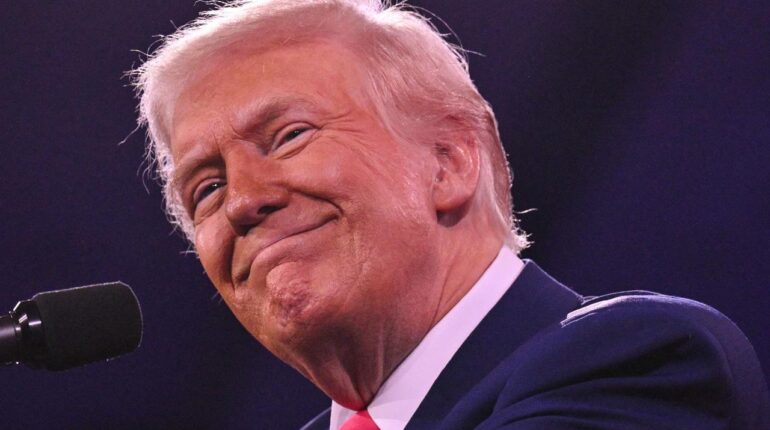📌 Trump’s shocking 30% tariff bombshell: The two words Mexico and EU leaders fired back with

Posted 13 July 2025 by: Admin
Trump Escalates Trade War: 30% Tariffs Target Mexico And EU
Donald Trump has dramatically raised the stakes in his trade war, announcing 30% tariffs on Mexico and the European Union effective August 1. The steep duties represent a significant escalation from his previous levies—25% on Mexican goods and 20% on EU imports—marking one of his most aggressive trade moves since returning to office.
The President delivered the ultimatum through formal letters posted on his Truth Social platform, citing Mexico’s role in drug trafficking and persistent trade imbalances with Europe as justification for the punitive measures. « Starting August 1, 2025, we will charge Mexico a Tariff of 30% on Mexican products sent into the United States, » Trump declared in his letter to Mexican President Claudia Sheinbaum.
The announcement targets two of America’s largest trading partners simultaneously, disrupting established commercial relationships that have anchored global supply chains for decades. While products entering under the US-Mexico-Canada Agreement remain exempted, the tariffs threaten to reshape North American trade dynamics fundamentally.
Trump’s latest salvo comes as his administration faces mounting pressure to deliver concrete trade agreements after promising sweeping deals with international partners. So far, only Britain and Vietnam have secured new pacts, alongside temporarily reduced duties with China—a modest tally that has left markets questioning the effectiveness of his confrontational approach.
The August 1 deadline now looms over international negotiations, with both Mexico and the EU scrambling to avoid the economic fallout.
International Backlash: “Unfair Deal” Sparks Diplomatic Crisis
The scramble has already begun, and the initial responses reveal deep diplomatic fractures. Mexico delivered the first blow during Washington negotiations Friday, with economy and foreign ministries jointly condemning Trump’s ultimatum. « We mentioned at the table that it was an unfair deal and that we did not agree, » officials declared, setting the tone for what promises to be contentious bargaining.
European leaders responded with equal force but more measured language. European Commission President Ursula von der Leyen warned that imposing 30% tariffs would « disrupt essential transatlantic supply chains, to the detriment of businesses, consumers and patients on both sides of the Atlantic. » Her statement underscored the far-reaching consequences beyond mere trade statistics.
French President Emmanuel Macron escalated the rhetoric significantly, expressing « very strong disapproval » and calling on the EU to « step up the preparation of credible countermeasures » should negotiations fail. His intervention signals Europe’s willingness to retaliate rather than accept Trump’s terms unconditionally.
The Netherlands joined the chorus of opposition, with caretaker Prime Minister Dick Schoof describing the tariffs as « concerning and not the way forward. » Italian Prime Minister Giorgia Meloni struck a more diplomatic tone while emphasizing the need to avoid « a trade clash between the two sides of the Atlantic. »
Despite the unified opposition, both Mexico and the EU maintained their commitment to continued negotiations, hoping to prevent the August 1 deadline from triggering a full-scale trade war.
High Stakes Negotiations: Mexico’s Vulnerability Exposed
Behind Mexico’s diplomatic defiance lies a stark economic reality that gives Trump unprecedented leverage. The country ships 80% of its exports to the United States, creating a dependency that transforms every tariff threat into an existential challenge for Mexican businesses and workers.
This asymmetric relationship explains why President Claudia Sheinbaum, despite her government’s public opposition, projected confidence Saturday about reaching a deal. « We are going to reach an agreement with the US government, » she declared hours after Trump’s social media announcement, suggesting backroom calculations had already begun.
The mathematics are unforgiving. Mexico’s northern neighbor represents not just its largest trading partner but an economic lifeline that cannot be easily replaced. While European nations can diversify trade relationships across multiple continents, Mexico faces geographic and economic constraints that limit its bargaining power.
Yet Sheinbaum’s optimism may not be misplaced. Current negotiations seek alternatives that would « protect businesses and jobs on both sides of the border, » according to Mexican ministries. More importantly, products entering under the US-Mexico-Canada Agreement remain exempted from the tariff threat, providing a crucial safety valve.
The talks scheduled before August 1 will test whether Mexico’s vulnerability translates into capitulation or whether creative diplomacy can bridge the gap. Sheinbaum believes Friday’s Washington discussions positioned Mexico for a « better position » by the deadline, suggesting room for maneuvering remains despite the overwhelming economic imbalance.
Global Economic Uncertainty: Trade War Reaches Critical Juncture
While Mexico negotiates for survival, the broader global economy teeters on the edge of an unprecedented trade confrontation. Trump’s tariff blitz now spans over 20 countries, each receiving updated levy letters that reshape international commerce with mathematical precision.
The European Union stands ready with its most powerful weapon: €21 billion in retaliatory duties currently suspended until July 14. This economic sword of Damocles hangs over American exporters while Brussels weighs its next move, knowing that escalation could trigger a cascade of tit-for-tat measures across continents.
Canada faces its own 35% tariff threat, joining a growing list of nations caught in Trump’s trade war machinery. Yet despite this aggressive global campaign, the administration’s scorecard remains surprisingly thin. Only Britain and Vietnam have secured comprehensive deals, exposing the gap between Trump’s promises of « a flurry of agreements » and diplomatic reality.
Financial markets reflect this uncertainty, with stop-start tariff policies creating volatility that ripples through supply chains and boardrooms worldwide. The unpredictability has become a economic factor in itself, forcing companies to hedge against policy shifts rather than focus on growth.
« One of the most precarious moments of the trade war so far, » warns Josh Lipsky from the Atlantic Council, capturing the delicate balance between negotiation and economic warfare. August 1 looms as more than a deadline—it represents a potential inflection point where Trump’s tariff gambit either forces global capitulation or triggers the largest trade war in modern history.




















